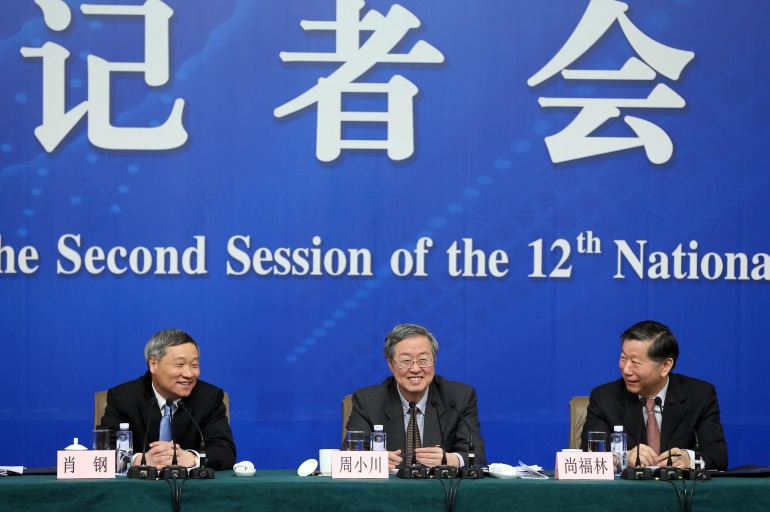Freeing China from the servitude of banks

Xiao Gang, Chairman of the China Securities Regulatory Commission, Zhou Xiaochuan, Governor of the Peoples Bank of China (PBOC), and Shang Fulin, Chairman of the China Banking Regulatory Commission (CBRC), smile during a press conference for the Second Session of the 12th NPC (National Peoples Congress) at Media Center in Beijing, China, 11 March 2014. (AP)
People's Bank of China Governor Zhou Xiaochuan has said China’s deposit rates are likely to be fully liberalised in one or two years. When that happens, it will be a momentous event in the history of China’s long march towards becoming a fully-fledged market economy.
The move will mark the final step in the liberalisation of interest rates in China, allowing financial institutions to set the price of loans. This follows the central bank’s July 2013 decision to end all restrictions on lending rates, which previously had a floor of 70 per cent of the central bank’s benchmark rates.
When the central bank scraps the current ceiling on deposits, which is 110 per cent of the benchmark, it will mean the end of China’s decades-long policy of financial repression, which caps the rate that banks can pay savers.
This policy has long guaranteed a juicy spread for China’s state-owned banks at the expense of long suffering Chinese savers. Big state-owned banking giants like the Industrial and Commercial Bank of China and the China Construction Bank are easily some of the most profitable banks in the world.
Nicholas Lardy, a China economist from the Petersen Institute of Economics, estimates the cost of financial repression -- mainly through negative real interest -- to be about 255 billion yuan ($46 billion) or 4 per cent of GDP back in 2008.
It is not only Chinese savers who are victims of this policy of financial repression. The economy as a whole suffers because of its effect on efficiency. Ronald McKinnon, a well-known Stanford economist, who first developed the theory of financial repression, argues the policy would impede the efficiency of the financial system and hence impact economic growth negatively.
One clear example which supports McKinnon’s theory in China is the grossly distorted credit allocation policy in China. State-owned banks, because of the cheap costs of funding, favour other state-owned enterprises. They get healthy margins regardless and don’t bother with smaller and medium sized companies which are largely privately owned.
As a result, many Chinese firms from the dynamic private sector have to pay usurious rates of interest to loan sharks and other lenders to sustain their business operations. At the same time, the country’s vast saving pool is being channelled to low-yield and sometimes non-viable projects that lead to massive overcapacity in industries.
If and when the central bank carries out its promise of liberalising deposit rates, it will put a huge squeeze on the banks’ previously guaranteed margins. These banks will be forced to look for higher returns from the private sector which they have long ignored.
When Business Spectator spoke to the Chairman of the Construction Bank of China Wang Hongzhang -- one of the country’s largest lenders -- he said the financial reform package which includes interest rates liberalisation would have a “huge impact on bank’s profitability.”
He said the bank needed to quickly diversify its revenue streams and aim to have 50 per cent of its profits from non-lending activities such as leasing, investment banking, securities, overseas business and private wealth management.
As Business Spectator has argued in two earlier columns, the emergence of internet finance in China is hastening the pace of financial reform. Financial products like Yuebao from e-commerce giant Alibaba is acting as a catalyst and putting pressure on banks to change (Alibaba and the Chinese banking thieves 26 February, Alibaba’s Yuebao gives China's banks a rude awakening 6 March).
The central bank governor readily admitted to the positive influence of Yuebao at yesterday’s press conference during the annual session of China’s parliament. He said that during the process of interest rates liberalisation, there will be new opportunities in the market. According to Zhou, these opportunities will lead to high returns that the market will chase.
At the moment, internet-based financial products like Yuebao offer almost twice the returns to savers than traditional one-year fixed deposit rates. The money market fund that manages cash for Yuebao has grown from a few billion yuan to half a trillion in about eight months as savers are fleeing banks at a record rate.
Zhao’s announcement yesterday will go down in China’s financial history as one of the most important landmark events. It is a strong signal that the country’s central bank is serious about reform and it is the silver lining to an otherwise dark cloud that is the Chinese economy.













